VOTER GUIDE
 On Tuesday, June 30, Faith in Public Life and Interfaith Power & Light released a voter reflection guide endorsed by prominent national faith groups and religious leaders. The guide, Democracy, Values & the 2020 Election, addresses urgent issues in the election, including voting rights, climate change, systemic racism in the criminal justice system, healthcare and immigration. The guide, which will be distributed across the country for discussion in diverse faith communities, includes topics for reflection and sample questions to ask candidates Download Full Guide Here
On Tuesday, June 30, Faith in Public Life and Interfaith Power & Light released a voter reflection guide endorsed by prominent national faith groups and religious leaders. The guide, Democracy, Values & the 2020 Election, addresses urgent issues in the election, including voting rights, climate change, systemic racism in the criminal justice system, healthcare and immigration. The guide, which will be distributed across the country for discussion in diverse faith communities, includes topics for reflection and sample questions to ask candidates Download Full Guide Here
Download Spanish-language version of the guide, Democracia, Valores y las Elecciones de 2020
Issues and Questions
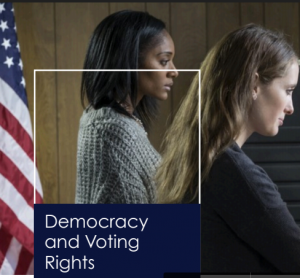 Democracy and Voting Rights (Page 1)
Democracy and Voting Rights (Page 1)
This election is more than a choice between parties and ideologies. An even more fundamental question is at stake: Can we preserve democracy in the face of serious threats to fair elections and fundamental rights?
Questions for Reflection and Candidates
- How do you see democratic values at risk today?
- How do systemic barriers to voting undermine our most sacred democratic values?
- How can your faith community better advocate for stronger voter protections at the state and local level?
- As a candidate, what are your specific plans for protecting and strengthening voting rights?
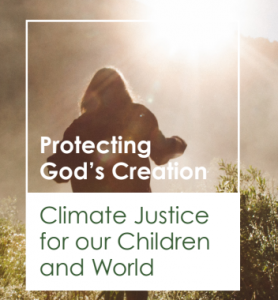 Protecting God’s Creation Climate Justice for our Children and World (Page 2)
Protecting God’s Creation Climate Justice for our Children and World (Page 2)
As people of faith, we believe that responding to the urgent threat of climate change is essential to caring for God’s creation and loving our neighbors. Human activity, primarily the burning of fossil fuels for energy, has thrown
nature out of balance, polluted the air, driven thousands of species of God’s creatures to extinction, intensified catastrophic events such as wildfires and hurricanes, and threatened the lives and livelihoods of our most vulnerable brothers, sisters and neighbors around the world. Scientists tell us we have less than a decade to avoid even more catastrophic consequences.
The United States has a unique responsibility to show moral and political leadership:
- Transitioning our economy away from polluting fossil fuels toward 100% clean energy.
- Honoring the emissions-reduction commitments our nation made at the UN Conference on Climate Change in Paris in 2015, and taking additional actions needed to avert catastrophic global warming.
- Assisting developing nations— who are least responsible for climate change but most impacted by it — in coping with threats such as increased droughts, disease, and sea-level rise by sharing technology and financial support.
Questions for Reflection and Candidates
- What does your faith teach about our responsibilities for the Earth and to others? How are they interdependent?
- Has your faith community made an effort to cut emissions, save energy, or practice environmental stewardship?
- As a candidate, what specific policies do you support to protect God’s Creation and secure a safe climate for our children and future generations?
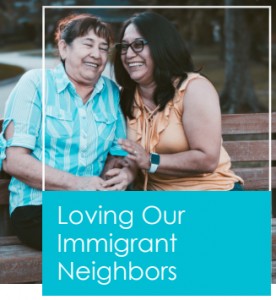 Loving Our Immigrant Neighbors (Page 4)
Loving Our Immigrant Neighbors (Page 4)
Scripture repeatedly makes clear that immigrants must be treated with dignity. Policies that rip children from their parents’ arms, lock people away in inhumane conditions, and ban desperate families from entering the country
should keep us awake at night. As people of faith, we believe that the way we treat our immigrant neighbors is a sign of how we treat God.
Questions for Reflection and Candidates
- How can we replace immoral immigration policies that tear families apart and cause trauma with an immigration system that values families and affirms the dignity of allv people?
- What can we do to heal the wounds inflicted on immigrant communities by political rhetoric that portrays them as a dangerous “other?”
- If there are immigrants in our community who are feeling isolated and under threat, how can we show support and build connections?
- As a candidate, what will you do to defend the dignity of all immigrants, and how will you further policies that keep families together?
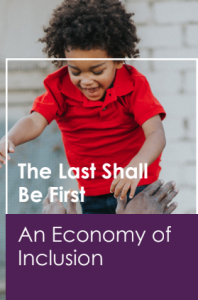 The Last Shall Be First An Economy of Inclusion (Page 5)
The Last Shall Be First An Economy of Inclusion (Page 5)
Our economic systems should work for all Americans, not only the wealthiest few. This is a matter of justice and
human dignity. All religious traditions recognize that charity is essential to care for the most vulnerable, but helping our neighbors in poverty also compels us to address its root causes. “Charity is no substitute for justice withheld,” St. Augustine observed centuries ago.
Questions for Reflection and Candidates
- What can we do to ensure that all Americans are able to provide for their families and live with security and dignity?
- How do we create a just tax system that is fair to all Americans, including working families who are trapped in poverty?
- Why does the United States lag behind most developed countries when it comes to providing paid sick leave and paid family leave?
- As a candidate, what are your specific plans to ensure workers have living wages and economic security while the coronavirus pandemic continues, as well as for the long term?
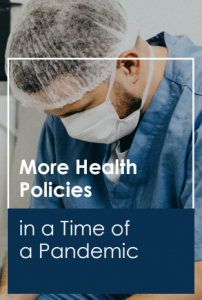 More Health Policies in a Time of a Pandemic (Page 7)
More Health Policies in a Time of a Pandemic (Page 7)
Despite our nation’s stated values of life and equality, the United States is the only industrialized country in the world that does not guarantee its residents universal access to health care. This is a failure of political and moral imagination – especially in a time of pandemic.
Questions for Reflection and Candidates
- How can people of faith be most effective in using our stories, congregations and power to advocate for health care reform?
- What do you struggle with the most when it comes to our healthcare system?
- How has the COVID-19 crisis impacted your community? What policy solutions can keep us all safe and remedy racial and economic inequalities in your community?
- As a candidate, what are your specific plans for making sure that quality,
affordable health care is available for all?
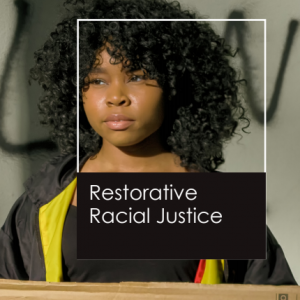 Restorative Racial Justice (Page 9)
Restorative Racial Justice (Page 9)
Justice and redemption are at the very heart of faith. Restorative justice begins with listening to and empowering communities that have been exploited, excluded and denied equal representation and freedom. The evil ideology of
white supremacy shaped our nation from its founding and continues to impact policies and communities today, especially in the criminal justice system. The killings of Ahmaud Arbery, Breonna Taylor, George Floyd and so many other Black people, Indigenous people, and other people of color, has provoked a growing, multi-racial moral movement for accountability and systemic reforms for racial justice.
Questions for Reflection and Candidates
- How can we dismantle the evil ideology of white supremacy in our culture and political systems?
- What can be done to end racial profiling and police violence against people of color?
- What steps can be taken to ensure formerly incarcerated people have voting rights and fair access to employment?
- As a candidate, what will you do to ensure racial justice is prioritized in the criminal justice system?
- How do we build safe communities for everyone, particularly people of color?
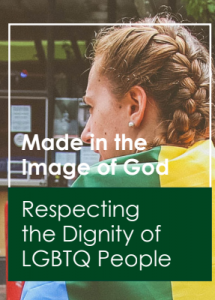 Made in the Image of God: Respecting the Dignity of LGBTQ People (Page 11)
Made in the Image of God: Respecting the Dignity of LGBTQ People (Page 11)
All people have inherent dignity because everyone is created in the image of God. Our gay, lesbian, bisexual and transgender family members, neighbors and co-workers deserve equal rights, and to live without fear or discrimination.
Questions for Reflection and Candidates
- How can your faith community more fully support the equal dignity of LGBTQ people in your state and local area?
- What are the greatest threats to LGBTQ people in your community and the nation?
- As a candidate, what are your specific plans to ensure that LGBTQ people have equal rights and are treated with dignity
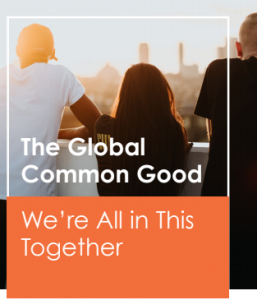 The Global Common Good: We’re All in This Together (Page 12)
The Global Common Good: We’re All in This Together (Page 12)
What does it mean to love our neighbors as ourselves in a globalized world? The health and future of our country and
communities are interconnected to the health and security of other nations. Our fates are bound up in what Rev. Martin Luther King, Jr., called “an inescapable network of mutuality.”
Questions for Reflection and Candidates
- What policies do you think are most important for creating security for your family and community?
- What role should the United States play in the world to help build global peace and security?
- How can your faith community advocate for policies to create a more peaceful world?
- As a candidate, what programs and policies would you prioritize to help build secure communities and a peaceful world?

Video: Tom Elmhorst Urges EPA to Finalize Methane Rule by End of Summer
/in Faithful Citizenship, Featured Articles, Media, NEWS, Permian Basin /by adminFrom leaking tanks to flaring, hear Tom Elmhorst’s #MyMethaneStory on why the Permian Basin needs swift action on methane emissions. The Environmental Protection Agency (@EPA) can protect communities by finalizing its rule to #CutMethane pollution by the end of the summer.
Kayley Shoup: Moratorium on future oil, gas leasing near schools a “good first step”
/in Faithful Citizenship, Featured Articles, NEWS, NMIPL in the News, Permian Basin /by adminKayley Shoup, community organizer for IPL NM-El Paso affiliate Citizens Caring for the Future in the Permian Basin, spoke to Hannah Glover of The New Mexico Political Report about the impact of a moratorium on future oil and gas leasing on state lands within a mile of schools.
State Land Commissioner Stephanie Garcia Richard issued the moratorium in May. She said various studies about the impacts of oil and gas emissions on children’s health prompted her to take action.
But, at the same time, Shoup acknowledged that oil and gas development will continue close to schools because much of the state trust land is already leased and new leases can also occur on other lands, including private and federally managed lands.
This is why Shoup and others are advocating for state-wide setbacks.
Read full article
Video: Kayley Shoup Thanks State Land Office for New Oil & Gas Rules
/in Actions, Faithful Citizenship, Featured Articles, Media, NEWS, Permian Basin /by adminKayley Shoup, organizer for Citizens Caring for the Future (an IPL New Mexico & El Paso affiliate), urges climate justice advocates to reach out to the State Land Office at slo-info@slo.state.nm.us to thank our commissioner, Stephanie Garcia Richard and her staff for taking action to stop oil and gas leasing on state lands within a mile radius of school and daycares